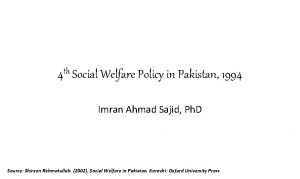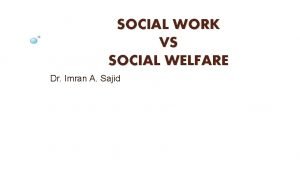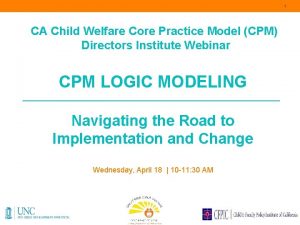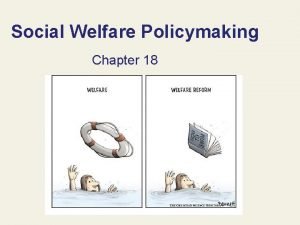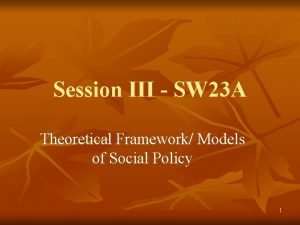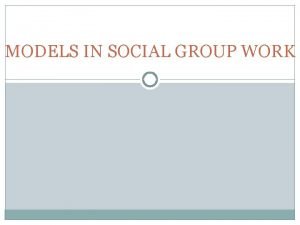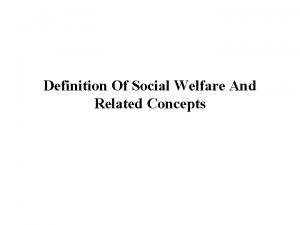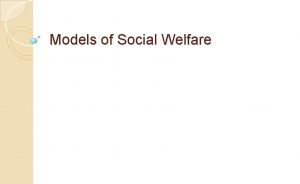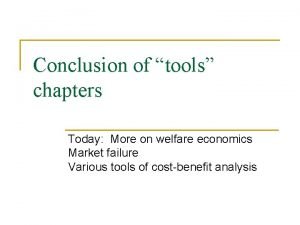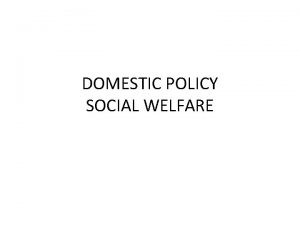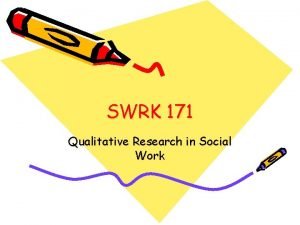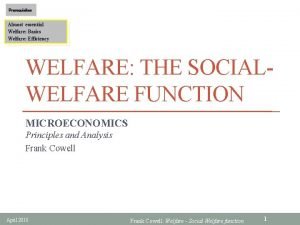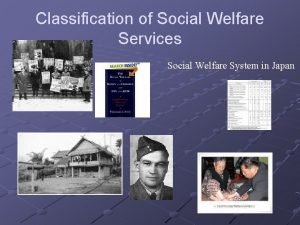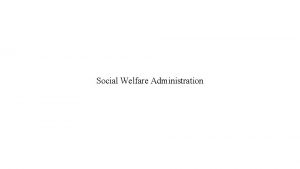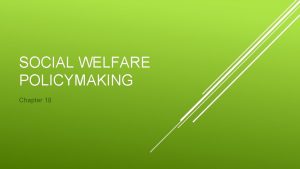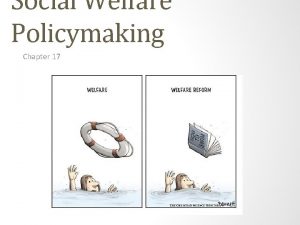SWRK 203 Social Welfare Policy II Policy Practice
















- Slides: 16

SWRK 203, Social Welfare Policy II Policy Practice and Policy Analysis

In this class, we will talk about �How government policies are connected to social work practice. �The social worker’s responsibility for developing new policies and promoting changes in policies that are not beneficial to clients, communities, or the profession of social work. �How to analyze the content of policies. �How to examine the process of policy-making. �How to influence the policy-making process through lobbying, the use of the media, policy analysis and report writing, and electoral politics.

Textbooks for this Class are: �Jansson, B. (2008). Becoming an effective policy advocate: From policy practice to social justice (5 th ed). Belmont, CA: Thomson Brooks/Cole. �Chambers, D. , & Wedel, K. (2005). Social policy and social programs: A method for the practical public policy analyst (4 th ed. ). Boston, MA: Allyn & Bacon. �The reading list also includes articles posted on the Internet and articles in the library’s Electronic Reserve system.

Class Assignments �Assignment #1: Internet Exercises on Analyzing Policy statements and positions �Assignment #2: Tracking Legislation �Assignment #3: Content Analysis of a Policy �Assignment #4: Advocacy Action Plan �Attendance Note: Assignments 2, 3, & 4 will focus on the state budget recently proposed by Governor Arnold Schwarzenegger

Attendance: Attendance will be taken during each class. Excused absences will be granted for reasonable cause only if the instructor is notified in advance prior to the absence. Points will be deducted from the student’s attendance grade for unexcused absences.

Extra Credit Assignments are listed in the course syllabus. For extra credit you can write letters on policy issues to newspapers or elected officials. You can also volunteer for election work or develop a webpage on a policy or political issue.

Methods of Instruction Include: �Lectures �Class Exercises �Videos and Films �Demonstration of Policy Analysis Techniques Using the Internet �Discussion of Current Policy Issues and Political Processes �Analysis of the State Budget

All course material can be found at: http: //zimmer. csufresno. edu/~donnah

Jansson uses the terms policy practice and policy advocacy in the book. �In social work, the term “policy practice” is generally used to indicate that advocacy for policy change is an inherent part of social work practice. �Can you think of how government policies have affected what you can do in your internship?

Jansson uses these two terms differently. �He defines policy advocacy as: “Efforts to change policies in legislative, agency, and community settings, whether by establishing new policies, improving existing ones, or defeating the policy initiatives of other people” (p. 14). �He defines policy advocacy as “policy practice that aims to help relatively powerless groups………to improve their resources and opportunities “(p. 14).

Some examples of policies that affect social work practice. �Social work licensure rules. �Federal child welfare policies that give preference to adoption and kinship care. � 5 year eligibility limit for TANF. �Immigration laws. �The requirement that reimbursement for mental health services be based on a diagnosis from the DSMTR

Are these policies consistent with social work principles and values? Should they be?

What are some of the principles that social workers believe should be upheld by policies? Do all social workers believe in these principles?

One of the principles we will be talking about in class is distributive justice, the principle that resources should be distributed equitably to all people in society. Do you think most resources in the U. S. are distributed equitably? Why?

We can think of policies as a stew or a “garbage can” in which a variety of things contribute to what the final policy contains. The composition of the stew includes: �Individual decision-makers. �The political affiliations, ideological perspectives, and vested interests of the people making the decisions. �The historical, political, and economic context in which the decision or policy is made. �Previous legislation or judicial decisions. �The power, influence, and vested interests of people influencing the change. �Who is voted into office and the likelihood that they will be voted out of office because of the decisions they make. �Public opinion and societal values. �The power and influence of the media.

Much of the course will focus on these factors and examine: �The content of policies. �The policy process. �How politics and the media influence policy decisionmaking. �How social workers can influence the policy process.
 2nd social welfare policy in pakistan
2nd social welfare policy in pakistan Social welfare vs social work
Social welfare vs social work Defining policy practice in social work
Defining policy practice in social work Cpm implementation
Cpm implementation Social welfare programs
Social welfare programs Industrial achievement model of social welfare
Industrial achievement model of social welfare Preventive model in social group work
Preventive model in social group work What is welfare
What is welfare Models of social welfare
Models of social welfare Conclusion of social welfare
Conclusion of social welfare Economic ethics
Economic ethics Social welfare in colombia
Social welfare in colombia Ethics and social welfare
Ethics and social welfare Social thinking and social influence
Social thinking and social influence Social thinking social influence social relations
Social thinking social influence social relations Nactrc
Nactrc Eecs 203
Eecs 203
